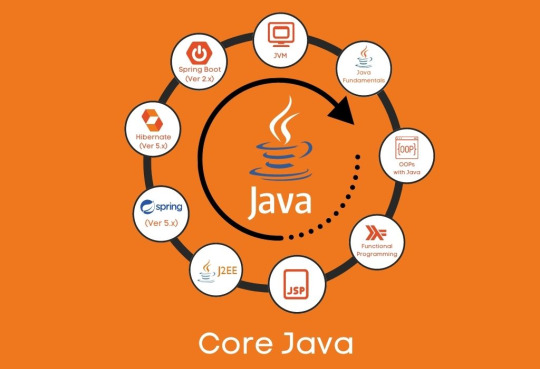#corejavacourse
Explore tagged Tumblr posts
Text

In the ever-evolving landscape of information technology, core Java holds a significant position as a programming language. Whether you are a seasoned developer or just starting your journey in the world of programming, understanding core Java is essential for building robust applications, web development, and securing a strong foundation in computer science. This article will delve into the various aspects of core Java, including its importance, training options, and the benefits it offers.
Core Java Course in Jaipur
IT Desk India is a company or organization that provides IT training and services, including core Java Training in Jaipur. It is likely that IT Desk India offers courses and programs focused on teaching core Java concepts to individuals interested in learning or enhancing their Java programming skills. As a recognized training institute, IT Desk India in Jaipur may have experienced instructors, a structured curriculum, and a supportive learning environment to help students succeed in their core Java journey. It is important to research and choose reputable institutions like IT Desk India when seeking professional IT training in Jaipur. learn Core Java Course in Jaipur by experts.
Core Java Key Elements
Variables and Data Types: Learn about different types of variables and data types available in Java, such as integers, strings, boolean, and more. Understand how to declare and manipulate variables in your programs.
Control Structures: Explore control structures like if-else statements, loops (for, while, do-while), and switch statements. Understand how to control the flow of your program based on certain conditions.
Object-Oriented Programming (OOP): Master the principles of OOP, including concepts like classes, objects, inheritance, polymorphism, and encapsulation. Learn how to create and work with objects to build modular and reusable code.
Exception Handling: Discover how to handle exceptions and errors in Java programs effectively. Learn about try-catch blocks, throwing and catching exceptions, and how to ensure proper program execution even in the presence of errors.
Input/Output (I/O) Operations: Gain knowledge of reading input from users and writing output to the console or files. Understand how to use the Java I/O classes to perform file-handling operations.
Arrays and Collections: Explore the use of arrays, Array Lists, Linked Lists, and other collection classes to store and manipulate groups of data. Understand the benefits and differences of each data structure.
Java Libraries: Familiarize yourself with commonly used Java libraries and APIs (Application Programming Interfaces). Learn how to leverage pre-built libraries to simplify programming tasks and enhance the functionality of your applications.
GUI (Graphical User Interface) Development: Get introduced to Java’s Swing or JavaFX libraries for creating graphical user interfaces. Learn how to design and build interactive windows, buttons, menus, and other GUI components.
Multithreading: Understand the concept of multithreading and learn how to create and manage multiple threads in Java programs. Explore techniques for concurrent programming and synchronization.
File Handling: Learn how to read from and write to files in Java. Understand file input/output operations, including reading and writing text files, binary files, and handling file exceptions.
Networking: Gain an introduction to Java networking concepts. Learn how to create client-server applications, communicate over TCP/IP or UDP, and exchange data between networked devices.
Database Connectivity: Discover how to connect Java applications to databases using JDBC (Java Database Connectivity). Learn how to execute SQL queries, retrieve and modify data, and handle database transactions.
The Significance of Core Java
Core Java forms the foundation of many modern applications and is widely used across industries. It provides a platform-independent, object-oriented programming framework that enables developers to write efficient and scalable code. From desktop applications to enterprise-level systems, core Java empowers programmers to create versatile and robust software solutions.
0 notes
Text

Core Java Course Training Institute in Jaipur
Understanding Core Java: The Foundation of Java Development
Java is a versatile and widely-used programming language known for its platform independence, object-oriented features, and robustness. Core Java forms the foundational concepts and building blocks of the Java programming language. In this article, we will explore the key components and concepts that make up core Java.
Introduction to Core Java
Core Java refers to the essential features of the Java programming language that provide the fundamental building blocks for creating Java applications. It encompasses the basics of Java, including its syntax, data types, control structures, and object-oriented programming concepts. Mastering core Java is crucial for any developer looking to build robust, efficient, and scalable Java applications. learn Core Java Course Training in Jaipur by experts.
Key Concepts of Core Java
1. Syntax and Structure
Java has a C-style syntax, making it relatively easy to understand and learn for developers familiar with languages like C or C++. It uses semicolons to terminate statements, curly braces to define blocks of code, and follows a class-based structure.
javaCopy code
public class HelloWorld { public static void main(String[] args) { System.out.println("Hello, World!"); } }
2. Data Types and Variables
Java has several primitive data types, including int, double, char, boolean, and more. These data types are used to declare variables and store different kinds of values in memory.
javaCopy code
int age = 30; double height = 5.9; char grade = 'A'; boolean isJavaFun = true;
3. Control Structures
Core Java includes various control structures such as if-else, switch-case, loops (for, while, do-while) to control the flow of the program based on conditions.
javaCopy code
int num = 10; if (num > 0) { System.out.println("Positive"); } else { System.out.println("Negative"); }
4. Object-Oriented Programming (OOP) Concepts
Java is an object-oriented programming language, and core Java introduces essential OOP concepts like classes, objects, inheritance, polymorphism, abstraction, and encapsulation.
javaCopy code
class Person { String name; void display() { System.out.println("Name: " + name); } }
5. Methods and Functions
Methods in Java are blocks of code that perform a specific task. They allow for code reusability and modularity.
javaCopy code
public int add(int a, int b) { return a + b; }
6. Exception Handling
Core Java covers exception handling, which is crucial for dealing with runtime errors. Java provides try, catch, and finally blocks to handle exceptions effectively.
javaCopy code
try { // code that may throw an exception } catch (Exception e) { // handle the exception } finally { // cleanup code }
Conclusion
Understanding core Java is essential for any developer aiming to become proficient in Java programming. The concepts discussed in this article provide a solid foundation for mastering Java and building robust applications. Continuously practicing and applying these core concepts will enhance your skills and pave the way for creating advanced Java applications.
0 notes
Photo

Core Java Training in Chennai
0 notes
Photo

We would like to point your attention to our upcoming batches of IT & Software Courses — both weekends and weekdays batches. With Unique System Skills India (Pvt) Ltd, there is no need to worry about your learning. We offer value-for-money, practical, and real-time training to expand your career. Enroll Now! Give way to your career and get 20% Off on all Courses.Hurry Up!
Limited seats Available
Enroll Now- +91 99706 66888Visit -: https://www.systemskills.in/inquiry/
1 note
·
View note
Video
youtube
Core Java Tutorials | Program on Constructor changing with in the same
#java#corejava#corejavatraining#corejavaonline#corejavaclasses#corejavacourses#corejavaonlinetraining#nareshit
1 note
·
View note
Link
Drona Training Academy provides the best Java Training for core Java. Core java course consists of following topics on Basics, OOPs, Methods, Overloading, Overriding, Inheritance, Polymorphism, Interfaces, Packages, Abstract classes, String handling, Exception handling, IO, Collections, Multithreading, Serialization and more. Get a Free Demo Today!
0 notes
Video
youtube
Core Java Tutorials | Internal Memory Location of String Object in Java? - Nareshit
#java#javatraining#javacourse#javatraininginhyderabad#corejavaclasses#corejavacourse#bestcorejavatraininginstitute
0 notes
Video
youtube
#CoreJava #Tutorial | How many Keywords are We using in Exception Handling - #Nareshit
0 notes
Video
youtube
Core Java Tutorial | Program on Abstract Class, Interface - #Nareshit
0 notes
Video
youtube
Core Java Tutorial | BiPredicate in Java 8 | Mr.Venkatesh
#java#corejava#corejavatraining#corejavaonlinetraining#corejavacourse#corejavaclasses#javaonlineclasses#javacourseonline#javatrainingonline
0 notes
Video
youtube
Core Java Tutorial | Can we able to Compile & Execute Java Program
#corejava#corejavaonlinetraining#corejavaclasses#corejavacourse#corejavatraining#corejavatrainingonline#onlinejavatraining#onlinejavacourse#nareshitjava
0 notes
Video
youtube
Terminology used in Collection Programming Part 3 | Core Java Tutorial | Mr. Hari Krishna
#java#javatraining#javaclasses#corejavatraining#corejavaclassses#corejavaonlinetraining#corejavatrainingchennai#corejavacourse#javatraininginchennai#javaclassesinchennai
0 notes
Video
youtube
What is Property or Variable in Java Part 13 | Core Java Tutorial | Mr. Ramachandra
0 notes
Video
youtube
How many ways can we create Object in Java Part 5.1 (Cloning) | Core Java Tutorial
#java#corejava#javaclasses#javatraining#javacourses#corejavatraining#corejavaonlinetraining#corejavafaqs#corejavanareshit#corejavacourse
0 notes
Video
youtube
What is Local Inner class? Advantages? | Core Java Interview Questions
#java#corejavafaqs#corejavaclasses#corejavatrainingchennai#corejavanareshit#corejavachennai#corejavacourse#corejava
0 notes
Video
youtube
What is Runnable state in Thread Life Cycle? | Core Java FAQs Videos
#corejava#corejavafaqs#corejavaclasses#corejavatraining#corejavacourse#corejavacoursechennai#corejavacourseinchennai#javacourse#javaonlinecourse
0 notes